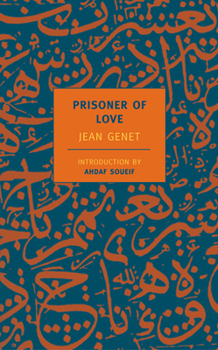Prisoner of Love
Select Format
Select Condition 
Book Overview
Written on the author's deathbed, this personal account of the plight of the Palestinians offers a unique viewpoint on the continuing Mideast conflict. This description may be from another edition of this product.
Format:Paperback
Language:English
ISBN:1590170288
ISBN13:9781590170281
Release Date:January 2003
Publisher:New York Review of Books
Length:430 Pages
Weight:1.02 lbs.
Dimensions:1.0" x 5.0" x 8.0"
Customer Reviews
3 ratings
A travel memoir, a masterpiece which can never be equaled
Published by Thriftbooks.com User , 18 years ago
If the reader is looking for easy explanations to the Palestinian refugees' war with the nation of Israel, Jean Genet's book is not the place to seek them. And I don't advise readers to pick through the text looking for the succinct sentences in which Genet clearly states why he's on the side of the Palestinians, or if he's anti-Israel, or anti-American. There is no proof of reviewer Tim Keane's conclusion that Genet "seethes with hatred of Israel"; there are no such violent emotions in Prisoner of Love. At 430 pages, be prepared to find subtleties of experience shaded by conflicting responses--nuances completely unavailable via print journalism or network news, CNN, or Al Jazeera. But the very fact that Genet wanted to observe life in the refugee camps shows that he had to make a choice. Nearly all the protagonists of his memoir, this textual "souvenirs," are Palestinians and generally Muslim. Indeed, the compelling force which drives the relatively plotless Prisoner of Love are the individuals to whom Jean attachments himself: the dynamic Lieutenant Mubarak, Dr. Mahjoub and the charismatic female doctor, Dr. Nabila, Khaled Abu Khaled and Abu Omar, and an accomplished woman friend, a blond Lebanese guide and translator, Nidal, and dozens of other people. Genet was particularly attached to Hamza and his mother, who he attempts to find again after his absence from Palestine for nearly 14 years. We cannot forget the common fedayee rebel, the fedayeen as a whole who fought to make the Palestinian plight known. When evaluating Prisoner of Love, it's important to remember that Genet is a writer. Throughout his work, Genet tells us how difficult it is to recount his experiences since he's not sure at times what he's seeing, and he must make his writing conform to the necessities of craft. And whatever writing craft decisions Jean made it is clear that the Palestinians "wrote" him as well; Jean was seldom in control of his experience. As I read, I realized that Genet is the ultimate refugee; he seeks to be with people who are like him. My conclusion is this: Palestine chose him. Only Genet could have written this book. He is a bruised romantic searching for a resting place that will caress both his homeless intellect and his orphaned body: "A little while ago I wrote that though I shall die, nothing else will. And I must make my meaning clear. Wonder at the sight of a corn-flower, at a rock, at the touch of a rough hand--all the millions of emotions of which I'm made--they won't disappear even though I shall. Other men will experience them, and they'll still be there because of them. More and more I believe I exist in order to be the terrain and proof which show other men that life consists in the uninterrupted emotions flowing through all creation" (361). As an orphan with prison experience, and disaffected from France, Genet was willing to try on other peoples' lives; I suspect that without the structure dictated by the craft of
intense,compelling as he allows, Genet a poet,a writer,first
Published by Thriftbooks.com User , 24 years ago
Genet allows you to feel the immediacy of the Palestinian situation with particles from lives,from ill-defined fragments of lives disrupted with no future,he stayed with a family in 1980 a half-day and a whole night where the young son,Hamza a fedayee went off at night to fight. Genet hearing gun fire in the distance inhabited his bed and was brought Turkish coffee and water in the night as a replacement for the young man,by his mother. Genet is a writer/poet,a political thinker,but never a man of politics, a deeply sensitive man,a virtuoso of the sensual image, as the starry-night reflected against the curtain in his room with the small blue table. "Of course it's understood that the words,nights,forests,septet,jubilation desertion and despair are the same words that I have to use to describe the goings on at dawn in the Bois de Boulogne in Paris when the drag queens depart after celebrating their mystery,doing their accounts and smoothing banknotes out of the dew."Genet was allowed with special permission to visit the massacre site at the camps at Sabra and Chantila,smelling the rotting flesh, "They happened I was affected by them. I talked about them. But while the act of writing came later, after a period of incubation,nevertheless in a moment like that or those when a single cell departs from its usual metabolism and the original link is created of a future,unsuspected cancer,or a piece of lace, so I decided to write this book."Genet has an intense need for passion of any dimension,scouring the vigours of whatever parts of fragments of the lifeworld's complexity presents itself to him. I once thought of this book as a romantic means of portrayel a betrayel of a political situation,one, the only one that excited Genet.It means something that only encounterings lives in struggle,bent into a repressive state that Genet finds the only life worth encountering,sensing and feeling about. This book was completed in 1986 after suffering from throat cancer, he died on the night of 14-15th of April,1986,while correcting proofs.
A great and unique work.
Published by Thriftbooks.com User , 25 years ago
This book is absolutely essential to any understanding of the Palestinian situation. It is also the mostimportant work of Genet's entire career.





